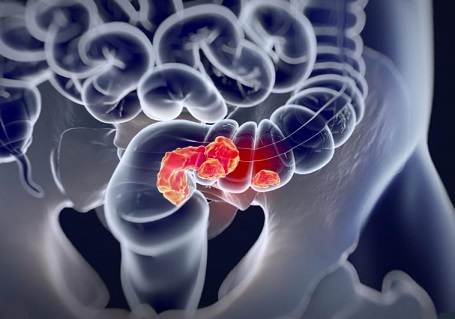Canadian study finds that Ursolic acid could be used as an adjuvant to combat colorectal cancer
Nikhil Prasad Fact checked by:Thailand Medical News Team Jul 26, 2024 8 months, 3 weeks, 5 days, 11 hours, 41 minutes ago
Cancer Updates: A Rising Hope in Cancer Research
Colorectal cancer, the third leading cause of cancer-related deaths worldwide, claims nearly 900,000 lives annually. The aggressive nature and low five-year survival rate of metastatic colorectal cancer underscore the urgent need for new treatment options. Enter ursolic acid, a compound found abundantly in plants such as cranberries, apples, and rosemary. This
Cancer Updates news report reviews recent evidence on the effects of ursolic acid on colorectal cancer, offering a glimmer of hope for patients and researchers alike.
 Canadian study finds that Ursolic acid could be used as an adjuvant to combat colorectal cancer
What is Ursolic Acid?
Canadian study finds that Ursolic acid could be used as an adjuvant to combat colorectal cancer
What is Ursolic Acid?
Ursolic acid is a naturally occurring pentacyclic triterpenoid, initially isolated from apples in the 1920s. Besides apples, it is present in high concentrations in cranberries, black elderberries, basil, rosemary, and lavender. Known for its wide range of biological activities, including anti-inflammatory, neuroprotective, antidiabetic, and anticancer properties, ursolic acid is now being studied for its potential to combat colorectal cancer.
The Study: Uncovering Ursolic Acid's Potential
Researchers Dr Amanda Kornel and Dr Evangelia Tsiani from Brock University in Canada conducted a comprehensive review of studies from the last decade on ursolic acid's effects on colorectal cancer.
Key Findings: In Vitro Evidence
-Suppressing Cancer Cell Growth
Studies have shown that treating colorectal cancer cells with ursolic acid significantly inhibits their proliferation and induces apoptosis (programmed cell death). For instance, when human colorectal cancer cells (HCT15) were treated with ursolic acid, an increase in cell fragmentation and death was observed. Similarly, HT-29 colon cancer cells showed decreased proliferation and increased apoptosis upon treatment with ursolic acid.
-Disrupting Cancer Signaling Pathways
Ursolic acid has been found to disrupt critical signaling pathways that cancer cells rely on for growth and survival. In HT-29 cells, ursolic acid decreased the phosphorylation of key signaling molecules such as EGFR, ERK1/2, p38 MAPK, and JNK. By inhibiting these pathways, ursolic acid effectively hampers the cancer cells' ability to thrive.
-Targeting Metastasis and Angiogenesis
Colorectal cancer cells treated with ursolic acid exhibited reduced migration and invasion capabilities, suggesting that the compound could help prevent cancer spread. Moreover, studies indicated that ursolic acid can inhibit angiogenesis (the formation of new blood vessels that supply the tumor), thus starving the cancer cells of nutrients and oxygen. For example, in HT-29 cells, ursolic acid reduced the expression of vascular endothelial growth factor (VEGF) and basic fibroblast growth factor (bFGF), both critical for angiogenesis.
In Vivo Evidence
-Reducing Tumor Growth in Animal Models
In animal studies, ursolic acid demonstrated significant anticancer effects. Mice xenografted with human colorectal cancer cells and treated with ursolic acid showed a marked reduction in tumor volume and weight. Importantly, these studies also indicated that ursolic acid did not adversely affect the animals' overall health, suggesting a low toxicity profile.
-Enhancing the Efficacy of Chemotherapy
Ursolic acid has shown promise in enhancing the efficacy of existing chemotherapy drugs. When combined with agents like 5-fluorouracil (5-FU) and oxaliplatin, ursolic acid significantly increased the cancer-killing effects of these drugs. For instance, in HCT15 cells, the combination of ursolic acid and 5-FU resulted in a higher number of apoptotic cells compared to either treatment alone. This synergistic effect suggests that ursolic acid could be used to potentiate the effects of chemotherapy, potentially allowing for lower dosages and reduced side effects.
-Inhibiting Drug Resistance
One of the significant challenges in treating colorectal cancer is the development of resistance to chemotherapy drugs. Ursolic acid has been found to inhibit mechanisms associated with drug resistance, such as the expression of drug efflux pumps (e.g., P-gp, MRP, and BCRP). By blocking these pathways, ursolic acid can help maintain the effectiveness of chemotherapy over longer periods.
Future Directions: Moving Towards Clinical Trials
While the findings from in vitro and in vivo studies are promising, more research is needed to fully understand ursolic acid's potential as an anticancer agent. Future studies should focus on:
-Conducting Human Clinical Trials: To determine the safety and efficacy of ursolic acid in human patients, clinical trials are essential. These trials will provide critical data on optimal dosing, potential side effects, and long-term benefits.
-Exploring Combination Therapies: Investigating the synergistic effects of ursolic acid with other chemotherapy agents and targeted therapies could uncover new treatment regimens that maximize anticancer effects while minimizing side effects.
-Elucidating Mechanisms of Action: Further research is needed to unravel the complex mechanisms through which ursolic acid exerts its anticancer effects. Understanding these pathways will aid in the development of more effective and targeted treatment strategies.
Conclusion: A Promising Future for Cancer Treatment
The evidence gathered from recent studies suggests that ursolic acid holds significant potential as a novel treatment for colorectal cancer. Its ability to inhibit cancer cell growth, disrupt critical signaling pathways, prevent metastasis, and enhance the efficacy of existing chemotherapy drugs positions it as a promising candidate for further research and development.
The study findings were published in the peer-reviewed journal: Nutraceuticals.
https://www.mdpi.com/1661-3821/4/3/22
For the latest
Cancer Updates, keep on logging to Thailand Medical News.
Read Also:
https://www.thailandmedical.news/news/defensins-the-double-edged-swords-in-colorectal-cancer-progression
https://www.thailandmedical.news/news/hipk2-protein-plays-key-role-in-colon-cancer-progression-and-therapy
https://www.thailandmedical.news/news/the-role-of-mirna-in-colorectal-cancer
